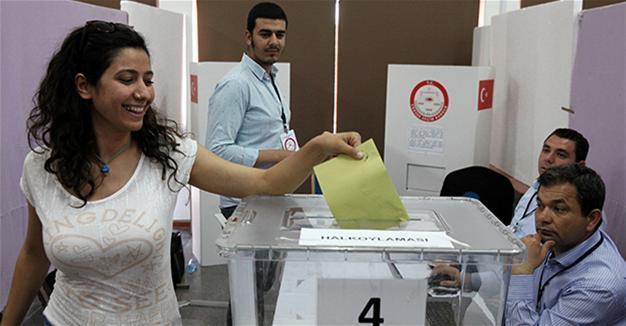More than 1 million Turkish expats vote in charter referendum
ISTANBUL - Anadolu Agency

REUTERS photo
More than 1.2 million Turkish expatriates have voted abroad ahead of the April 16 referendum on constitutional amendments, the Supreme Election Board (YSK) said on April 9.
Voting on the proposed constitutional changes, which could usher in an executive presidency with vastly enhanced powers for the president, have taken place at 120 polling stations in 57 countries since March 27, the YSK said in a statement sent to state-run Anadolu Agency.
About 70,000 people voted at customs gates in Turkey, and ballot boxes at the borders will remain open until April 16.
Approximately 2.9 million Turkish expatriates are eligible to vote in the referendum. The referendum is just the fourth time expatriates have had the opportunity to vote in Turkish elections.
Overseas turnout was 8 percent in the 2014 presidential election – the first time Turkish nationals were able to vote from abroad. By the November 2015 elections that figure had rose to 40 percent as a little more than 1 million Turks cast ballots.
As of April 9 morning, more than 600,000 Turks in Germany, where the majority of Turkish expats live, voted in the referendum, while nearly 132,000 voters went to polls in France, according to the YSK.
In the United States, nearly 35,000 people voted, according to unofficial figures, representing a 35 percent turnout – higher than that of the Nov. 1, 2015, general elections.
In Kazakhstan, 2,427 eligible voters went to polling stations, diplomatic sources told the agency.
A total of 14,359 ballots were cast in Australia, 8,322 voters exercised their rights in Saudi Arabia, 711 in Georgia and 346 in South Africa’s administrative capital of Pretoria.
With polling stations closed in Europe, votes will be transferred on April 10 to Turkey where they will be counted on April 16.
The voting in Europe began amid a diplomatic standoff between Turkey and Germany after German authorities cited security concerns and banned rallies by Turkish ministers who favor the proposed executive presidency.
Several German politicians have also publicly campaigned against the new system, drawing sharp criticism from the Turkish government and accusations of interference in Turkey’s internal affairs.
Tension also grew between Turkey and the Netherlands after Dutch authorities barred two Turkish ministers from addressing the expat community ahead of the referendum.
Foreign Minister Mevlüt Çavuşoğlu was refused permission to land in Amsterdam and Family Minister Fatma Betül Sayan Kaya – who had traveled to the Netherlands from neighboring Germany – was forced to leave the country under police escort after she was blocked from entering the Turkish consulate in Rotterdam.
Leading politicians in Austria, Germany and the Netherlands proposed a ban on rallies by Turkish politicians across Europe.
Austrian authorities also prevented former Energy Minister Taner Yıldız and ruling Justice and Development Party’s (AKP) deputies from speaking due to “security concerns.”
While European countries banned rallies in support of the “yes” campaign, they allowed Turkish opposition figures who back a “no” vote to hold demonstrations without hindrance.
The April 16 referendum in Turkey addresses a host of constitutional reforms that could hand wide-ranging executive powers to the president.
The post of prime minister could be abolished and the president could be allowed to retain ties to a political party.
Other changes include a reduction of the minimum age of parliamentary candidates to 18 and increasing the number of deputies increased from 550 to 600.
The changes also propose holding simultaneous parliamentary and presidential elections for a five-year term in November 2019.
